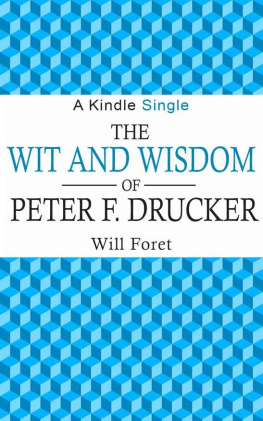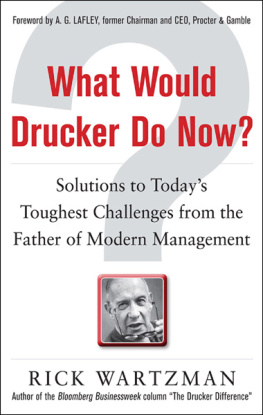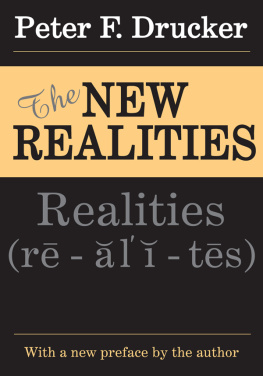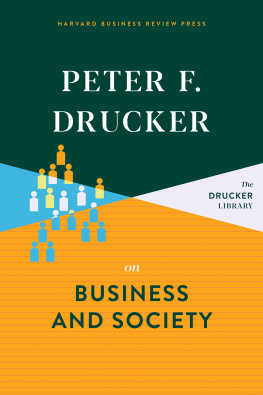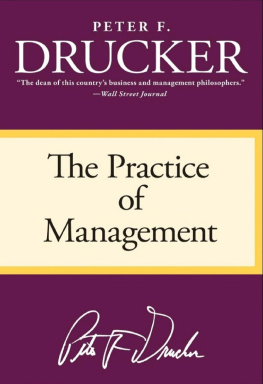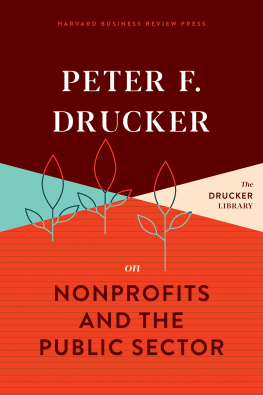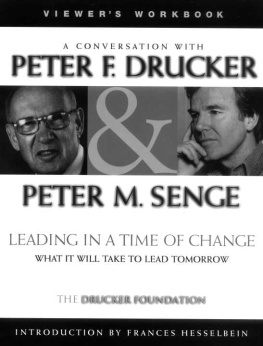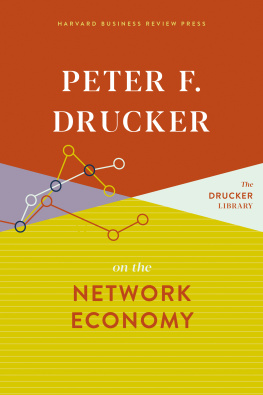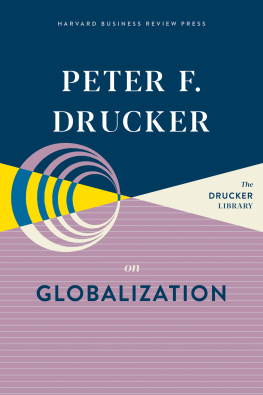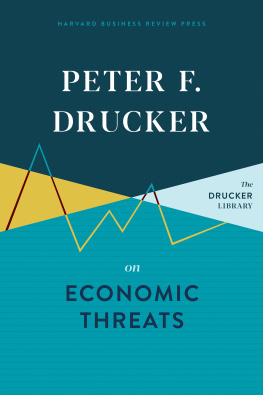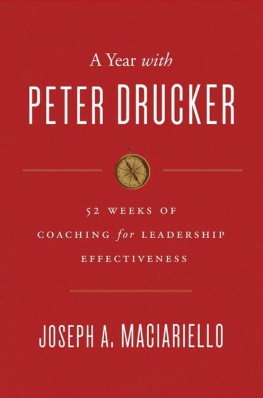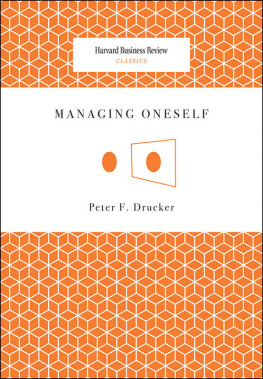The Wit and Wisdom of
Peter F. Drucker
Table Of Contents
Introduction
Chapter 1 Overview of Peter Drucker
Chapter 2Knowing Your Strength s
Chapter 3The Purpose and Objectives of a Busines s
Chapter 4Learning to be Effectiv e
Chapter 5The Second Half of Your Lif e
Chapter 6The Emergence of a Knowledge Societ y
Conclusion
If You Want Free Best Selling Kindle Books Delivered to Your Inbox On A Weekly Basis
Click Here

Introduction
I want to thank you and congratulate you for downloading the book The Wit and Wisdom of Peter. F Drucker
What You Will Learn
- This book contains proven steps and strategies on how to become a truly effective decision maker.
- Heres an inescapable fact: you will need to be ready to put your action steps in motion; this book provides resourceful steps just as effective as any guidebook on consulting !
- If you do not develop your fundamental skills to be an executing executive then chances are youve skipped a chapter .
- Its time for you to become an amazing entrepreneur, manager, and more.
Peter Drucker's wisdom is derived from his intellect and piercing attention to detail. He is conscious of the technicalities in processes of: thinking, planning, communicating, and executing an idea. In his wit he suggests that logic and definition are rules to utilize; paired with self-reflection, as well as self-confidence. His awareness of the literal nature of a statement or action grants him a tool for decision making that can be analyzed as the following: He has the ability to deconstruct a concept and formalize an order of operations; he also has an acquired talent for compartmentalizing and prioritizing what he believes to be the most important steps to follow.
Peter see's the simplicity in accepting true form, and original meaning without grey areas. If it is defined one way - then that is how it should be taken. He is a man of metrics and measures achievements against will, intelligence, risks, and ambition.
After listening and truly comprehending what Peter Drucker's advice presents - It is clear that his style of leadership involves separating important factors and structuring an executive level plan towards obtaining success. Additionally, these initiatives aren't at all filled with complexities, rather, creative realization of technicalities.
Chapter 1 - Overview of Peter Drucker
Peter F. Drucker was an author, teacher, administration specialist and self-portrayed "social secologist," who investigated the way individuals arrange themselves and associate much the way an environmentalist would watch and examine the natural world.
Credible news publishing sites have acknowledged Drucker's pioneering success. One nickname coined by BusinessWeek is "the man who created administration," Drucker specifically affected countless important figures of leadership during his time as a highly-recommended consultant. He influenced an extensive variety of associations over all segments of society. Among the numerous:
Intel, Procter and Gamble, IBM, General Electric, Girl Scouts of the USA, Red Cross, the Salvation Army, presidential organizations, and United Farm Workers.
Drucker, who had taught at New York University, Bennington College, and Sarah Lawrence College, spent the last 30 or so years of his profession on the staff at Claremont Graduate University. Later on in life, he received the country's most noteworthy civilian honor. It was in 2002, that he was presented with the Presidential Medal of Freedom.
Drucker's 39 books, alongside his incalculable insightful and well known articles, anticipated a significant number of the real improvements of the late twentieth century, including privatization and decentralization, the ascent of Japan to financial force to be reckoned with, the definitive significance of showcasing and development, and the rise of the data society with its need of long lasting learning. In the late 1950s, Drucker authored the expression "knowledge worker," and he spent whatever is left of his life looking at an age in which a remarkable number of individuals utilize their brains more than their backs.
All through his work, Drucker required a solid paritybetween transient needs and long haul maintainability; in the middle of benefit and different commitments; between the particular mission of individual associations and the benefit of everyone; in the middle of flexibility and responsibility.
Peter F. Drucker was born in 1909 in Vienna, Austria. He spent some time in England and Austria where he earned a doctorate in international and public law while attending Frankfurt University in Germany. A consultant social scientist, essayist, and resigned educator, he has been accredited to completing 41 works of literature. His books on financial aspects, management, legislative issues, and society have been translated into over 30 different languages. Using his published works as guidelines Peter crafted a series of expert training courses that include: in-person as well as online courses on business tactics and administration.
Dr. Drucker wrote for the Wall Street Journal for 20 years. He has written articles for renowned journals and publications including the Harvard business Review, The Atlantic Monthly, Foreign Affairs, The Economist, Financial Times, Inc. Harpers, and Fortune.
As an advisor, Dr. Drucker had practical experience in technique and strategy for governments, organizations, and philanthropic associations. His unique attention was primarily on the association and work of top management titles. He worked with many of the world's biggest organizations and with growing and startup organizations. Lately he has often worked with philanthropic associations, including colleges, churches, and clinics. He served as a specialist to various organizations of the U.S. government, with the administrations of Canada and Japan, and with different countries all through the world.
Drucker disliked the term "consultant," however it was through counseling that he wielded the best impact, beginning with his 1943 invitation to examine the hierarchical structure of the General Motors Corporation. The subsequent book, Concept of the Corporation, offered the first thorough evaluation of an expansive organization as a social institution. Drucker later served as an advisor to various governments and associations.
Drucker's various books articles can be separated into four classes. His frontier works, for example, The End of Economic Man (1939) and The New Society (1950) examine the way of modern culture. A second line of booksincluding Concept of the Corporation (1946) and The Practice of Management (1954)discusses general thoughts regarding current business administration. A third body of workincluding America's Next Twenty Years (1957) and Technology, Management and Society (1970) offers hypothesis on the future effect of such improvements as mechanical change. At long last, there are works that address inquiries of practical corporate administration, outstandingly Managing in Turbulent Times (1980) and the exposition gathering The Changing World of the Executive (1982). He vitalized the idea of the business visionary with Innovation and Entrepreneurship (1985). Drucker composed an additional pair of books. In 1990 the Peter F. Drucker Foundation for Nonprofit Management (renamed the Leader to Leader Institute in 2003) was set up in his honor.
Chapter 2 - Knowing Your Strengths
Sooner rather than later in Todays age we must learn to manage ourselves. To find a deeper understanding of ourselves we have to consider a small-few foundation building questions, such as:
Next page
